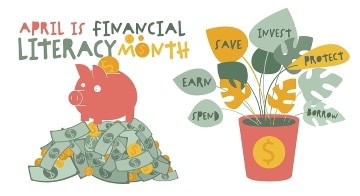
Use Financial Literacy Month to Protect Your Identity
Call Us Today For Your Shredding Estimate

April is Financial Literacy Month
There are three basic yet important factors you can use April’s designation as Financial Literacy Month to help you focus on:
- Manage your money
- Build your savings
- Protect your finances
If you don’t remain vigilant about protecting your personal finances, managing and building them could be all for naught. The Federal Trade Commission reported that consumers reported losing nearly $8.8 billion to fraud last year; a 30% increase over 2021. Investment scams accounted for $3.8 billion of that total.
No one’s finances are immune from being attacked, but everyone can avoid being a victim. While you’re working to pay the bills and building your savings, scammers are also working hard to try and steal the fruits of your labor.
Ways to Protect Your Finances
Protecting your personal financial information is vital, particularly when it involves your social security number, financial account numbers, and login credentials for your online accounts. In some of the worst situations, undoing the effects of identity theft can take years of hard work, red tape, and financial losses.
Here are some suggested basic principles to follow to increase your financial security:
1. Strong Password Habits
- Don’t share your passwords.
- Use long and passwords or passphrases that you can remember easily, but that someone else would not be able to guess. The longer the password or phrase, the more secure it will be.
- Use a variety of letters, numbers, and symbols.
- Avoid the obvious options like birthdays, addresses, or names. Yes, even your pets’ names.
- Don’t reuse the same password for multiple accounts. If you do, once a hacker gets your password, they can access all your accounts.
- Use a password management application. Do your homework to find one that works for you and have excellent ratings.
- Enable two-factor authentication (2FA) whenever it is offered to dramatically increase account security compared to single-factor authentication such as just using a password. 2FA may involve you receiving a verification code via text, voice, or authenticator app and entering it as part of the login process.
2. Checking Your Credit Reports
Every person in the US is eligible for a free credit report on a weekly basis from the three major credit bureaus: Equifax, Experian, and TransUnion. Visit www.AnnualCreditReport.com to obtain these and:
- Check for fraudulent activity
- Check for incorrect information
- Sign up for credit alerts. These free reports will alert you if your spending is too high or if a new credit account has been created. This adds an extra layer of protection.
3. Avoiding Scams
Be very careful when accepting friend requests on social media. Vet anyone who wants to connect with you because hackers are very skilled at using information stored in your personal social media accounts to hack into your bank accounts. Simple information like birthdays or your mother’s maiden name can be valuable. Ignore or block friend requests you don’t know and keep your profile and post settings as private as possible rather than posting publicly every time.
4. Shredding
The best way to discard any physical document, hard drive, or other data storage media that has sensitive information is to have it shredded. Here are a few items you should always have securely shredded when you no longer need them:
- Credit card offers that come in the mail
- Credit card or bank statements
- Tax records that have reached the end of their lifecycle
- Canceled and voided checks
- Old driver licenses or ID cards
- Travel itineraries and used airline tickets
- Old contracts and proposals
- Hard drives and other electronic media
- and much more
To better safeguard your private financial information and increase your protection, engage a local, reputable shredding company. If you have a lot of discarded information, have a shredding truck come to you for a one-time purge shredding service. If you only have a couple of bags or boxes to shred, consider visiting a drop-off shredding location.
Wiggins Shredding provides secure shredding services for residents and businesses in Pennsylvania and the Tri-State area of Maryland, New Jersey, and Delaware. To inquire about our shredding services, call us at 610-692-TEAR (8327) or complete the form on this page. Our friendly shredding experts are standing by!
